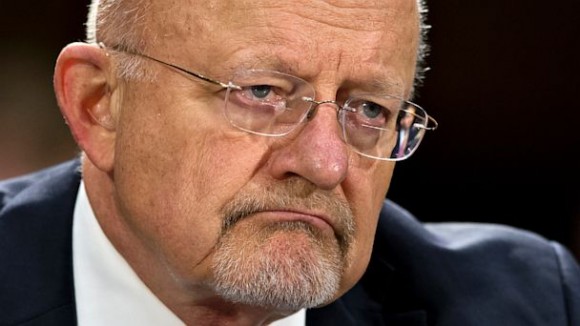
The National Security Archive, an organization founded “to check rising government secrecy,” has awarded its annual Rosemary Award to James Clapper “for worst open government performance in 2013,” chiefly for his now infamous lie to Sen. Ron Wyden that the NSA doesn’t collect information on millions of Americans.
Despite heavy competition, Clapper’s “No, sir” lie to Senator Ron Wyden’s question: “Does the NSA collect any type of data at all on millions or hundreds of millions of Americans?” sealed his receipt of the dubious achievement award, which cites the vastly excessive secrecy of the entire U.S. surveillance establishment.
The Rosemary Award citation leads with what Clapper later called the “least untruthful” answer possible to congressional questions about the secret bulk collection of Americans’ phone call data. It further cites other Clapper claims later proved false, such as his 2012 statement that “we don’t hold data on U.S. citizens.”
The Archive’s “not-so-coveted Rosemary Award in 2005, named after President Nixon’s secretary, Rose Mary Woods, who testified she had erased 18-and-a-half minutes of a crucial Watergate tape,” the press release explains.
“Bestowed annually to highlight the lowlights of government secrecy, the Rosemary Award has recognized a rogue’s gallery of open government scofflaws, including the CIA, the Treasury Department, the Air Force, the FBI, the Federal Chief Information Officers’ Council, and the career Rosemary leader — the Justice Department — for the last two years,” the Archive adds in its statement.
In addition to Clapper, the Archive also recognizes NSA chief Gen. Keith Alexander, former FBI director Robert Mueller, the Justice Department, and President Obama for what you might call dishonorable mentions. Essentially, their inclusion is based on successive lies told to the American people about the surveillance programs revealed by Edward Snowden.
- Gen. Keith Alexander, director of the NSA, for multiple Rose Mary Woods-type stretches, such as (1) claiming that the secret bulk collection prevented 54 terrorist plots against the U.S. when the actual number, according to the congressionally-established Privacy and Civil Liberties Oversight Board (PCLOB) investigation (pp. 145-153), is zero; (2) his 2009 declaration to the wiretap court that multiple NSA violations of the court’s orders arose from differences over “terminology,” an explanation which the chief judge said “strains credulity;” and (3) public statements by the NSA about its programs that had to be taken down from its website for inaccuracies (see Documents 78, 85, 87 in The Snowden Affair), along with public statements by other top NSA officials now known to be untrue (see “Remarks of Rajesh De,” NSA General Counsel, Document 53 in The Snowden Affair).
- Robert Mueller, former FBI director, for suggesting (as have Gen. Alexander and many others) that the secret bulk collection program might have been able to prevent the 9/11 attacks, when the 9/11 Commission found explicitly the problem was not lack of data points, but failing to connect the many dots the intelligence community already had about the would-be hijackers living in San Diego.
- The National Security Division lawyers at the Justice Department, for misleading their own Solicitor General (Donald Verrilli) who then misled (inadvertently) the U.S. Supreme Court over whether Justice let defendants know that bulk collection had contributed to their prosecutions.
- The same National Security Division lawyers who swore under oath in the Electronic Frontier Foundation’s Freedom of Information Act lawsuit for a key wiretap court opinion that the entire text of the opinion was appropriately classified Top Secret/Sensitive Compartmented Information (release of which would cause “exceptionally grave damage” to U.S. national security). Only after the Edward Snowden leaks and the embarrassed governmental declassification of the opinion did we find that one key part of the opinion’s text simply reproduced the actual language of the 4th Amendment to the U.S. Constitution, and the only “grave damage” was to the government’s false claims.
- President Obama for his repeated misrepresentations about the bulk collection program (calling the wiretap court “transparent” and saying “all of Congress” knew “exactly how this program works”) while in effect acknowledging the public value of the Edward Snowden leaks by ordering the long-overdue declassification of key documents about the NSA’s activities, and investigations both by a special panel and by the Privacy and Civil Liberties Oversight Board.
Read the full page announcing the award here.




NSA believes that he is under the influence of Russians, which is a meaningless statement. it can be construed anyway. i don't know what it means being under the influence of Russians. is he working? he is impressed by them?
When someone reveals that government officials have routinely and deliberately broken the law, that person should not face life in prison at the hands of the same government.
??? ???????
??? ????????
??? ???
??? ?????
??? ??? ?????
??? ????????
??? ???
???
????? ??
???? ??
????? ????
???? ?? ????
????? ??
????? ??? ?????
????? ?????
????? ???
??? ??????? ??? ???????
??? ?????
??? ?????
??? ?????
??? ?????
??? ?????
??? ?????
???
??? ?????
??? ?????
???
??? ?????
??? ???
??? ??????
??? ???
??? ??
?????? ?????
???
????? ???
??? ????
?????
??
????
???? ?? ????
??
????
???? ????
???????
??????? ?????
??? ?????
??? ?????
??? ???????
??? ??
???? ?? ????
??? ?? ????
??? ???
??? ????
???? ???
??? ????? ?????
??? ???? ?????
??? ???? ?????
??? ?????
??? ???